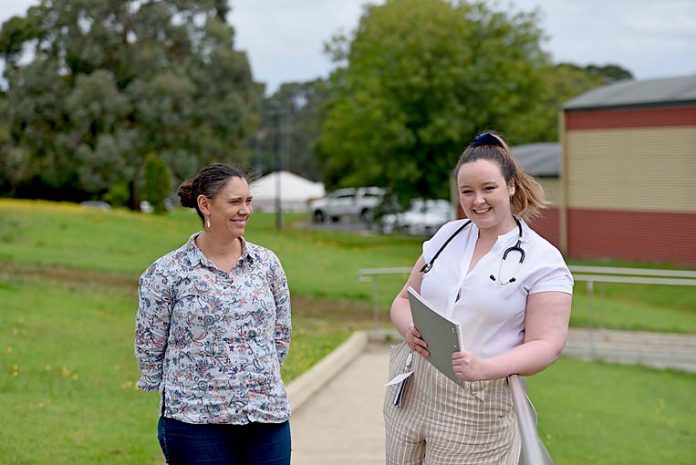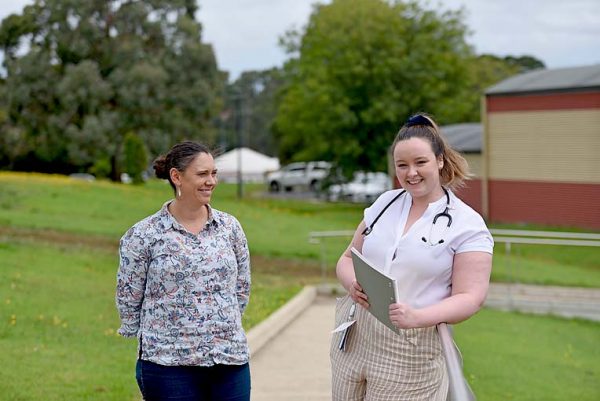

MOUNT Gambier medical clinics are under pressure from a shortfall in general practitioners and registrars, which is driving up waiting times for patients.
Some patients are waiting weeks to gain an appointment or have had appointments cancelled due to a reduction in the city’s GP workforce.
According to city’s medical clinics, a number of general practitioners have relocated and there has been a fall in new registrars choosing to live in the Blue Lake city.
It is understood doctors are taking on higher patient workloads and the shortage is contributing to an upswing in the number of people attending the Mount Gambier Hospital’s emergency department
Ferrers Medical Clinic practice manager Anne Bierwirth confirmed there had been some lengthy wait periods for patients.
“The clinic has had some extended wait periods in the last few months due to a reduction in our GP workforce,” Ms Bierwirth said.
During this transition period, she said there had been some “cancellations and delays” due to this shortage.
“Along with a few other clinics, a couple of our GPs have moved on to school children in a college of their choice in Melbourne and one has moved interstate for further clinical studies,” Ms Bierwirth said
“But we have welcomed a new GP to our practice this month and hope to see another GP in August which will improve our wait times.”
Hawkins Medical Clinic practice manager Dale Beatty also confirmed the medical centre had also seen a number of its GPs leave the clinic.
“We have also had doctors leave our practice this year and the numbers of new registrars available to join us are well below our needs,” Mr Beatty said in a statement to The Border Watch.
“We normally offer four new registrar positions each year however for 2020 have only been allocated one new registrar.”
But he said the clinic had another international medical graduate awaiting registration and hoped he would begin by June 2020.
“We are constantly looking to recruit doctors to increase our doctor numbers however this can involve a lead time of up to a year.”
Despite the pressure on clinics, Mr Beatty said Hawkins Clinic had no restriction on taking new patients wishing to transfer from another practice.
“These patients need to arrange for a transfer of records from their previous practice and will need a longer initial appointment with a Hawkins Clinic GP to go through their medical history,” he explained.
“A new patient is generally offered an initial appointment within seven to 10 days.”
Mr Beatty said Hawkins Clinic tried to look after the daily needs of its own patients every day.
“However, it does not have the capacity to also provide appointments on the day to patients of other clinics who have not been able to get to see their usual doctor,” he said.
Flinders University Rural Health South Australia head of discipline Dr Leesa Walker said there was a rural GP shortage across regional South Australia.
“The shortage is not just in Mount Gambier,” Dr Walker said.
She said there was a falling trend in the number of people training to become general practitioners.
“We understand there is a number of reasons for this, it is not seen as a desirable career anymore by some people,” Dr Walker said.
There are also perceptions GPs were regularly on call and that people were seeking a work-life balance.
Dr Walker said Flinders University has had a presence in Mount Gambier since 2001, which was helping to attract and retain doctors in regional areas.
She said medical students were able to undertake at least 12 months of their study in Mount Gambier.
Conceding there was a need to boost the city’s GP workforce, Dr Walker said Flinders University’s medical student training program had made major inroads into attracting and retaining GPs in the region.
Figures reveal 30pc of students who go through the program return to rural areas.
“This is having a positive impact, but more needs to be done,” Dr Walker said.
She said the Mount Gambier-based program had been successful given its strong partnerships with other GP clinics and regional hospitals.
“Mount Gambier has first class GP practices. Hawkins Medical Clinic was named the national practice of the year in 2019,” Dr Walker added.
It is estimated more than 150 medical students have gone through the Flinders training program since its inception.
This year a group of 11 third-year students will undertake the 12-month program in the Blue Lake city, who will be joined by seven of their peers who will intern at the hospital this year.
Dr Walker said it was vital a community had access to high quality and available GP workforce given it leads to better health outcomes and quality of life.
Rural Doctors Association of SA has urged the SA Government to establish and fund a rural generalist training pathway for the state to entice more junior doctors to become the rural generalists so “desperately” needed in rural and remote SA.
“Nationally there has been a big drop in junior doctors applying to undertake GP training, but SA is also falling behind states like Queensland and NSW when it comes to offering a well-supported Rural Generalist training pathway,” association resident Dr Peter Rischbieth said.
“This is creating a double-whammy, where we are losing junior doctors – some of whom want to become our future rural doctors – to other states, because they can access the training they need there.
“Without such a pathway, we will struggle to attract the right doctors with the right skills to provide high quality medical services across rural SA into the future.”







